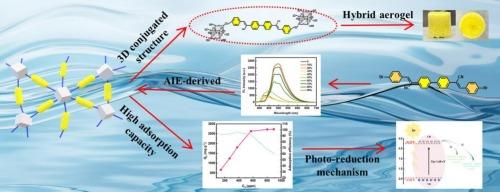AIE-derived fluorescent silsesquioxane-based hybrid aerogel for light-enhanced gold recovery
IF 8.3
1区 工程技术
Q1 ENGINEERING, CHEMICAL
引用次数: 0
Abstract
In this work, two aggregation-induced emission (AIE)-active organic fluorescent monomers (TPV, TPC) were synthesized by Knoevenagel reaction of 2,2′-([1,1′-biphenyl]-4,4′-diyl)diacetonitrile with benzaldehyde and 4-bromobenzaldehyde, respectively. Subsequently, two fluorescent hybrid porous polymers with semiconductor performance (PCS-TPV, PCS-TPC) were prepared successfully by connecting octavinyl silsesquioxane (OVS) with TPV and TPC through Friedel-Crafts reaction and Heck coupling, respectively. Among them, PCS-TPV with a hyper-crosslinked structure offered a specific surface area of up to 1165 m2 g−1; PCS-TPC was the first AIE-derived fluorescent hybrid silsesquioxane-based semiconductor polymer with 3-D conjugated structure. Compared with PCS-TPV, PCS-TPC exhibited stronger visible light absorption, higher fluorescent performance and quantum yield due to its high AIE-active unit content. Besides, PCS-TPC exhibited a remarkable gold recovery capacity (Qm = 2728 mg g−1) when exposed to visible light irradiation. Adsorption mechanism revealed that the photoelectrons produced by PCS-TPC under visible light irradiation reduced all adsorbed Au(III) to Au(I) and Au(0). Furthermore, a hybrid aerogel was prepared through physical blending of PCS-TPC with chitosan, overcoming the limitation that insoluble powder was difficult to process and recycle. This work provided a very efficient, sustainable, and industrially feasible way for gold recovery in e-waste.

基于硅倍半氧烷的 AIE 衍生荧光混合气凝胶用于光增强黄金回收
本研究通过 2,2′-([1,1′-联苯]-4,4′-二基)二乙腈分别与苯甲醛和 4-溴苯甲醛的克诺文纳格尔反应合成了两种具有聚集诱导发射(AIE)活性的有机荧光单体(TPV、TPC)。随后,辛钒基硅倍半氧烷(OVS)分别与 TPV 和 TPC 通过弗里德尔-卡夫斯反应和赫克偶联成功制备了两种具有半导体性能的荧光杂化多孔聚合物(PCS-TPV 和 PCS-TPC)。其中,PCS-TPV具有超交联结构,比表面积高达1165 m2 g-1;PCS-TPC是第一种由AIE衍生的具有三维共轭结构的硅倍半氧烷基荧光杂化半导体聚合物。与 PCS-TPV 相比,PCS-TPC 的 AIE 活性单元含量高,因此具有更强的可见光吸收能力、更高的荧光性能和量子产率。此外,当暴露在可见光照射下时,PCS-TPC 还表现出显著的金回收能力(Qm = 2728 mg g-1)。吸附机理显示,PCS-TPC 在可见光照射下产生的光电子将所有吸附的金(III)还原为金(I)和金(0)。此外,通过将 PCS-TPC 与壳聚糖进行物理混合,制备出了一种混合气凝胶,克服了不溶性粉末难以加工和回收的局限。这项工作为从电子垃圾中回收金提供了一种非常高效、可持续且在工业上可行的方法。
本文章由计算机程序翻译,如有差异,请以英文原文为准。
求助全文
约1分钟内获得全文
求助全文
来源期刊

Desalination
工程技术-工程:化工
CiteScore
14.60
自引率
20.20%
发文量
619
审稿时长
41 days
期刊介绍:
Desalination is a scholarly journal that focuses on the field of desalination materials, processes, and associated technologies. It encompasses a wide range of disciplines and aims to publish exceptional papers in this area.
The journal invites submissions that explicitly revolve around water desalting and its applications to various sources such as seawater, groundwater, and wastewater. It particularly encourages research on diverse desalination methods including thermal, membrane, sorption, and hybrid processes.
By providing a platform for innovative studies, Desalination aims to advance the understanding and development of desalination technologies, promoting sustainable solutions for water scarcity challenges.
 求助内容:
求助内容: 应助结果提醒方式:
应助结果提醒方式:


